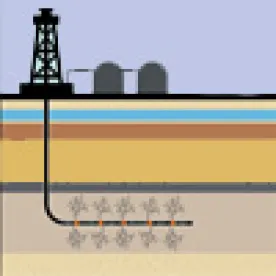On April 7, 2015, the United States Environmental Protection Agency (EPA) issued proposed regulations which would create pretreatment standards of performance for existing and new sources of wastewater from hydraulic fracturing operations. EPA is proposing to establish a “zero discharge” effluent limitation which would continue the current industry practice of not discharging wastewater from unconventional oil and gas operations (UOG) to publicly owned treatment works (POTWs). While the proposed rule should not surprise anyone, it is worth noting some of EPA’s comments and rationale for the rule as well as some disposal options.
In the “purpose and summary” portion of the preamble to the rule, EPA explained its desire to provide regularity clarity and discussed the characteristics of UOG wastewater that are problematic for POTWs:
Responsible development of America’s oil and gas resources offers important economic, energy security, and environmental benefits. EPA is working with states and other stakeholders to understand and address potential impacts of hydraulic fracturing, an important process involved in producing unconventional oil and natural gas, so the public has confidence that oil and natural gas production will proceed in a safe and responsible manner. EPA is moving forward with several initiatives to provide regulatory clarity with respect to existing laws and using existing authorities where appropriate to enhance human health and environmental safeguards. This proposed rule would fill a gap in existing federal wastewater regulations to ensure that the current practice of not sending wastewater discharges from this sector to POTWs continues into the future. This proposed rule does not, however, address the practice of underground injection of wastewater discharges from this sector since such activity is not subject to the CWA but rather the Safe Drinking Water Act (SDWA) (see TDD Chapter A.3). …
UOG extraction wastewater can be generated in large quantities and contains constituents that are potentially harmful to human health and the environment. Wastewater from UOG wells often contains high concentrations of total dissolved solids (TDS) (salt content). The wastewater can also contain various organic chemicals, inorganic chemicals, metals, and naturally-occurring radioactive materials (referred to as technologically enhanced naturally occurring radioactive material or TENORM).
80 Fed. Reg. 18557, 18559 (April 7, 2015) (footnotes omitted).
Throughout the proposed rulemaking, EPA cited to its Technical Development Document for Proposed Effluent Limitations Guidelines and Standards for Oil and Gas Extraction (TDD), Document No. EPA–821–R–15–003 (DCN SGE00704), which EPA asserts supports the rulemaking.
The TDD includes a discussion of the acceptance by POTWs of UOG wastewater primarily in Pennsylvania in the early years of the Marcellus shale gas play. EPA noted that the operators stopped discharging to POTWs voluntarily in response to the request by the Pennsylvania Department of Environmental Protection (DEP) that they stop discharging UOG extraction wastewater to POTWs in April 2011.
At an Air & Waste Management Association luncheon in Pittsburgh on May 7, 2015, Eric Gustafson, Oil and Gas Program Manager for Pennsylvania DEP’s Southwest Regional Office, explained that 87.7% of the UOG wastewater was recycled by operators in Pennsylvania in 2014. The remainder was sent out of state for disposal in underground injection control (UIC) disposal wells or treated at centralized waste treatment facilities, both of which are subject to regulation under other subparts, 40 CFR parts 144-148 and 40 C.F.R. part 437, respectively. Mr. Gustafson predicted an increase in UIC wells permitted in Pennsylvania which would reduce the cost of transporting the wastewater out of state as well as the risk of accidental release during transport.
The proposed rule prohibiting the treatment of UOG wastewater by POTW’s would transform an industry practice into a regulatory obligation but would not seem to create problems for unconventional oil and gas operators. And while recycling of wastewater may continue to be the preferred strategy for Pennsylvania operators, there are other disposal options.



 />i
/>i

